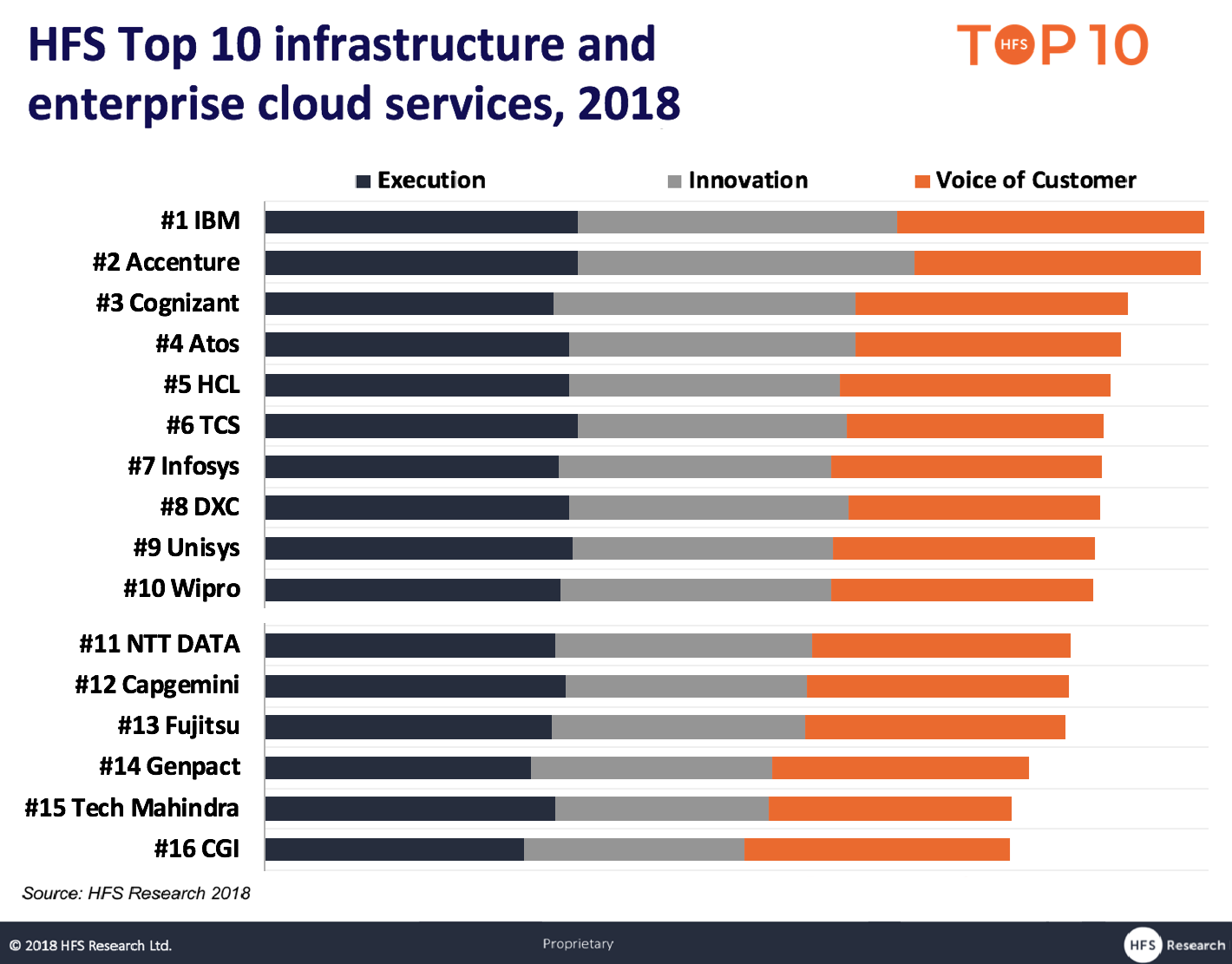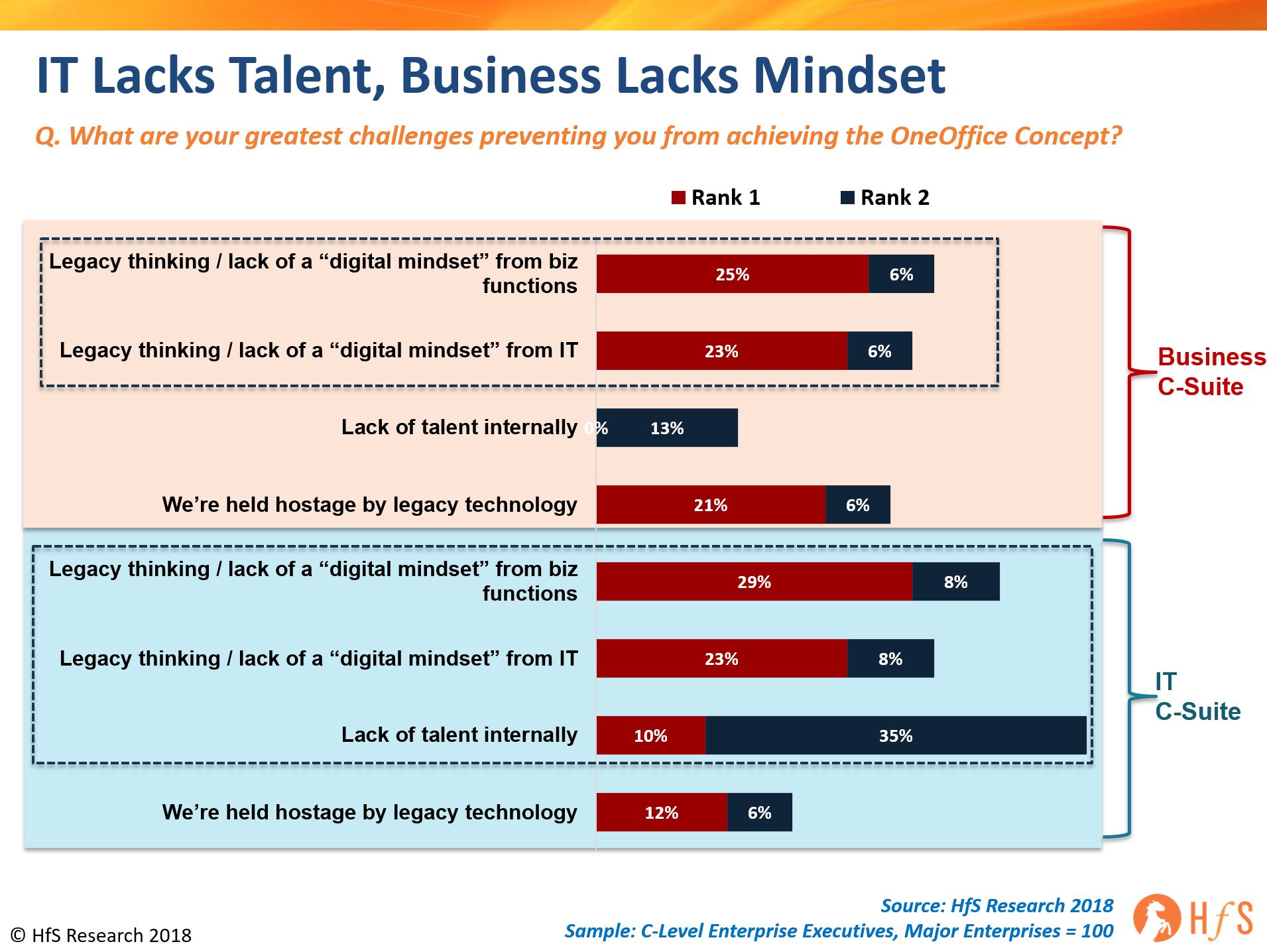it’s easy to overlook our digital underbelly during these times of AI hype and “let’s make a few billion based purely on investor hype” fantasies. But who’s providing the tools and grunt to make all this possible? HFS analyst Ollie O’Donoghue has pooled our study data from the Global 2000, conducted countless enterprise interviews and driven the providers potty to deliver the perfect poignant viewpoint of this industry:
Click for a detailed view of the leading 18 providers
Ollie, what are the major trends in the infrastructure market?
Over the last few years, the infrastructure market has taken a bit of a battering with the kings of hyperscale eroding market share, and enterprises looking for more exciting things to spend their money on than traditional “lift and shift” engagements. However, that’s all changing, and the market is evolving. The big providers are partnering up with the hyperscale cloud players and making them a valuable tool in their toolbox. Moreover, “digital” has fueled enterprises’ appetite for technology. Which means getting their infrastructure and digital foundations in order. After all, these overhyped technologies like AI and blockchain have to run off something!
The challenge for us as analysts covering the space is rethinking how we assess and evaluate providers. In essence, partnerships have become a much more critical part of this market – if a firm isn’t befriending the big cloud leviathans, then they’re likely to struggle to build offerings that resonate with evolving enterprise appetite. The challenge is that as all providers follow this path, there’s a degree of equilibrium, so the assessment needs to evolve further and evaluate how these providers are leveraging partnerships, and building value-add offerings. We also need to scrutinize how providers are developing automation capabilities to design and build more resilient, scalable and cost-effective infrastructure solutions for clients. So while this is a mature market, it’s one that’s changing all the time – and one that certainly keeps us, analysts, busy.
So who’s winning this infrastructure and cloud war?
IBM’s still the undisputed champion of the infrastructure and cloud market – Big Blue brings with it unrivalled enterprise trust, and is the only IT Services major that truly has the cloud capability and resources to fight alongside the hyperscale leviathans AWS, Google, and Microsoft. It also has true scale and ability to manage the largest most complex engagements in this space. That being said, Accenture has an uncompromised reputation for delivering quality and bringing best in class capabilities to engagements. From an enterprise perspective, the fact that this comes at a premium count against the firm to some extent. And while Accenture executives assure us they’re building commercial models to make pricing more attractive, the reputation for being expensive is relatively well set in, and any changes might be like trying to get toothpaste back into the tube. Although let’s be honest, there are worse problems to have than being known for delivering quality at a price.
And the main movers and shakers in the Top 5?
A couple of firms are worth mentioning – Atos performed well because of a concerted effort from the firm to broaden and deepen partnerships with major cloud players. It’s now shaken hands with all of the big hyperscale players and is doing some exciting work around analytics with Google. Atos has also pulled some fresh thinking out of the bag and built a compelling vision for hybrid cloud. HCL has excelled at large scale transformation, is also doing interesting work in the space and comes with strong client references – the consensus is, HCL will keep working to get the job done, bringing in automation capabilities to get the most out of assets. And then we have Cognizant, another firm that is striving to deliver innovation through all its infrastructure services is producing offerings that focus on specific client’s needs. Ensuring business value is delivered, whilst pushing hard down the hybrid cloud path – in recognition that the future of cloud will be leveraging multiple providers to deliver the best results.
So what about the Top 10 overall, any surprises there, Ollie?
The big heavy lifters hold a competitive position, TCS brings a lot to the party and has an enviable track-record of delivery in some industries and loyal clients that leverage the firms considerable global delivery network. Similarly, Infosys is positioned competitively, reflecting the investment the firm is making in building out nearshore delivery centers and redeveloping talent into higher value areas of work. However, the firm does struggle to get its message out there which is holding it back a tad. And then we have DXC – the leviathan firm can bring considerable brains and brawn to engagements, but its path is still unclear to some clients and all eyes are on its financial reports looking for stability at a time when providers sinking can drag clients down with it. Unisys relies on its strong legacy in the Infrastructure space – and innate trust from some industries, particularly financial services. Supplemented by respectable security credentials and offerings. Finally, Wipro is driving a competitive approach to writing off legacy through a cloud-only approach, a strategy which could see the firm drive further up the top 10 list in the future.
So what does the future look like for the market?
We’ve been charting the major trends impacting the infrastructure space for some time now and it’s a quickly moving market. Partnerships are no longer a nice-to-have, they are mandatory if providers are going to have a chance of survival. Finally, the big providers are warming to the potential value they can leverage from the cloud giants, rather than shaking hands through gritted teeth as their revenues eroded. This is an important step as the market matures. But the biggest shift is the rosier tint the market now has after years of revenue freefall. Shifts to cloud and as-a-service hammered traditional revenues – which often made up a sizeable chunk of vendor revenues. But with some compute-heavy applications and technologies on the cards, spending on infrastructure is very much back in vogue. The smart enterprises are investing in their digital underbelly now, in preparation for their future digital needs.
Bottom line: Our partners who got us here may not be the ones to take us where we’re going – the future’s all about smart partnering as the need for savvy IT talent reaches critical levels
If we take a look at revenue projections for the market, it’s not the good news providers are looking for. With As-a-Service and cloud continuing to batter traditional revenues, the market is unlikely to grow from a revenue perspective. But it’s not going to shrink either – we see this market is bouncing back in other ways as enterprises urgently seek help digitizing their operations and scaling their digital businesses: technology is at the heard of C-Suite strategy these days, and partnerships which provide scarce talent to keep these increasingly data-driven environments agile, scalable and secure are critical for enterprises.
Reputationally, IT infrastructure has always had a hard time – security breaches, server crashes, and integration challenges. But all of that’s changing now as automation drives service quality up, and costs down. And partnerships are supporting providers in offering clients best-in-class cloud capabilities at a time when the contents of their digital shopping list needs to be running on the best.
There is a massive opportunity to lead in the world of IT services, provided you can plug these skills gaps. The challenge is breaking out of the traditional sourcing model to access niche talent across the globe in areas such as crypto-technology, Python development, Lisp, Prolog, Go and C++. While most traditional firms still rely heavily on bread and butter IT services delivered at scale from regions such as India, the emergence of talent in Central and Eastern Europe, China and parts of South America also need to be brought into play. The IT services world will be a very different place in a couple of years as boutique firms offering niche skills come into the fore. Not to mention the emergence of crowdsourcing for IT talent. Having really savvy IT leaders who can cobble together crack teams on-tap to solve their IT headaches is already becoming a huge differentiator for many firms. The will also be a role for the super services integrator, who can pull together teams for clients to work with them on complex projects.
To this end, we recently presented the Digital OneOffice Concept to 100 C-Suite executives to understand what is holding back both business and IT leaders from reaching the promised land of perfect real-time symmetry of their business operations staying ahead of their customers’ needs. While the business leaders grapple with changing their mindsets, the IT leaders were quick to call out their skills deficiencies to enable their businesses to achieve a digital OneOffice.
Hence, those providers which can pull together the resources and talent can still profit from this disruptive market – the digital engine can only purr when it’s aligned with all the core components of the business, right from the front to back office. Today’s market is all about taking bigger bets on bigger risks… and only the smartest and boldest will make it.
Posted in : Cloud Computing, Digital Transformation, OneOffice







